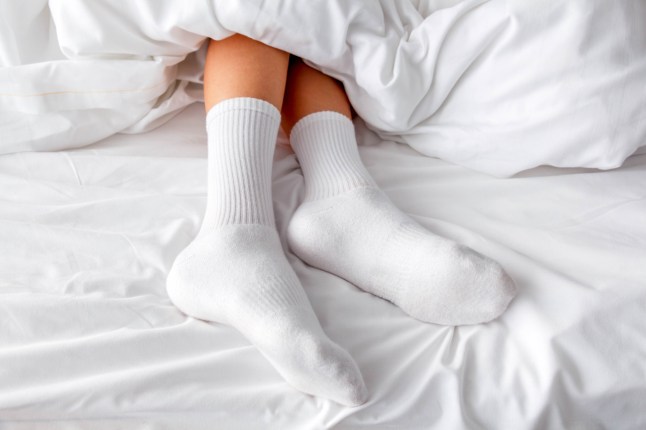4 Jun, 2025 | Admin | No Comments
‘Top tier’ sleep hack calms your nervous system in seconds — and you might already do it


Sleep can sometimes be a complicated beast, as according to the NHS, around one in every three Brits struggles with insomnia.
But there is one unique trick doing the rounds on TikTok that’s allegedly helping countless people doze off– and it’s called the ‘cricket feet’ or ‘cricketing’ method.
With over 50 million views and 265,000 searches this month alone, it’s a self-soothing technique that involves rubbing the feet together gently and repetitively as you’re trying to fall asleep. Sometimes, it’s even done subconsciously.
When @notyouraveragethrpst asked her followers ‘who else is laying in bed just “cricketing” their feet?’ many were surprised to hear that it was a common thing.
‘Didn’t know it had a name,’ @ezeee1717 shared, adding that they’ve ‘been doing it [their] whole life.’
Another, @lindsaybatista, said they thought they were the ‘only one’ who did it, while @maureensqueo commented that they ‘often’ used it as a coping mechanism when when they’re ‘having a lot of anxiety.’
Does the ‘cricket feet’ method help you get to sleep?
As adult sleep consultant and The Sleep Works founder Maryanne Taylor tells Metro, while there isn’t a huge amount of direct research on the links between ‘cricket feet’ and sleep, it does tap into ‘self-soothing behaviours that can help calm the nervous system.’
‘Gentle, repetitive movements like this can signal safety to the brain, especially during wind-down time,’ she explains. ‘They activate the parasympathetic nervous system (your calm setting), which helps the body relax enough to fall asleep.’
Maryanne’s top tip for ensuring a good night’s sleep is a ‘calm nervous system, but she says that a peaceful, uninterrupted slumber isn’t just shaped by nighttime routines – it also comes down to ‘habits, thoughts, and behaviours’ throughout the day.
And if the brain has been in ‘go mode’ all day long with little to no opportunity to slow down, it’s ultimately ‘not surprising that it struggles to wind down at bedtime.’
‘Building in micro resets during the day to give the brain a chance to process and decompress, together with a wind-down routine that genuinely soothes the mind, rather than just ticking boxes, can be hugely helpful,’ Maryanne says.

Are ‘cricket feet’ more common for neurodivergent people?
Neurodivergent people have also long been sharing that they enjoy ‘cricketing’ as a stimming behaviour – a self-stimulatory repeated movement for either sensory stimulation, or to ‘keep calm and express joy,’ according to the National Autistic Society.
TikToker @_joossiiee included ‘cricket feet’ in a list of their ‘neurodivergent sleep habits that are completely satisfying,’ alongside ‘aggressive face rubs’ and ‘the cave,’ which involves burrowing under the duvet, burrito-style.
Meanwhile, @florishwithvicki described it as a ‘top tier stim.’
This checks out, too, as Maryanne says that research does support ‘cricketing’ as a self-soothing behaviour for neurodivergent people.
This is because those with ADHD or autism in particular have a ‘natural need for repetitive movement or sensory input for emotional comfort,’ which in turn helps to ‘calm their brain and regulate their nervous system.’
But ‘cricket feet’ aside, Maryanne has another self-soothing sleep system to recommend: the pre-bed ‘brain dump.’
‘Before bed, write down three things you don’t need to think about until tomorrow,’ she explains, noting that this technique helps ‘relieve the build-up of mental pressure that impacts as soon as you lie down in bed.’
In her view, the brain wants to ‘hold onto everything it thinks is important,’ so processing it on a piece of paper ‘gives you permission to let go for the night.’
Likewise, she suggests dimming the lights earlier than you normally would – at least an hour before bed, as softer lighting helps the brain to ‘transition’ into sleep mode, as well as supports natural melatonin production (AKA, the sleep hormone).
Ready to sleep like a baby tonight? Sweet dreams.
Do you have a story to share?
Get in touch by emailing MetroLifestyleTeam@Metro.co.uk.
Write Reviews
Leave a Comment
No Comments & Reviews